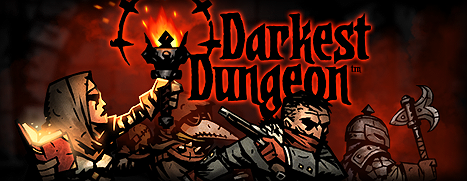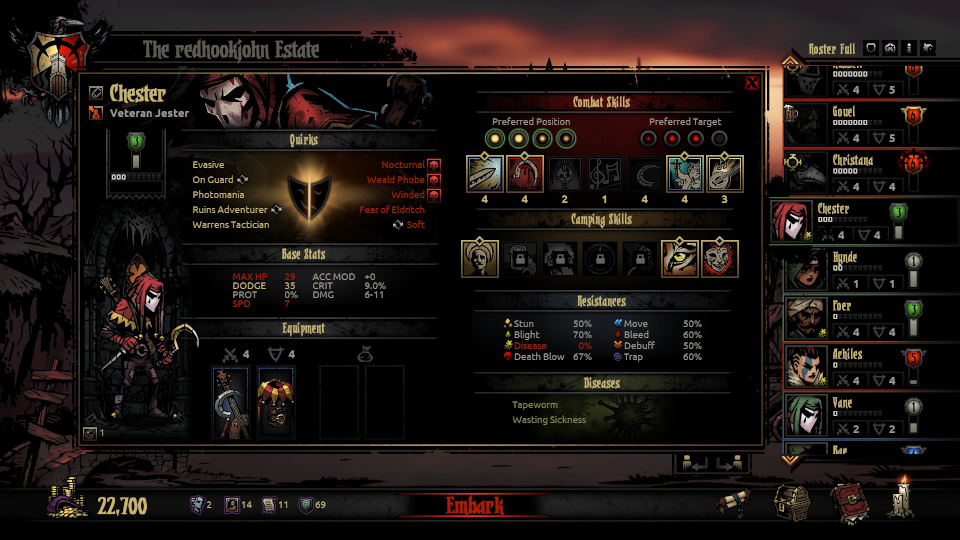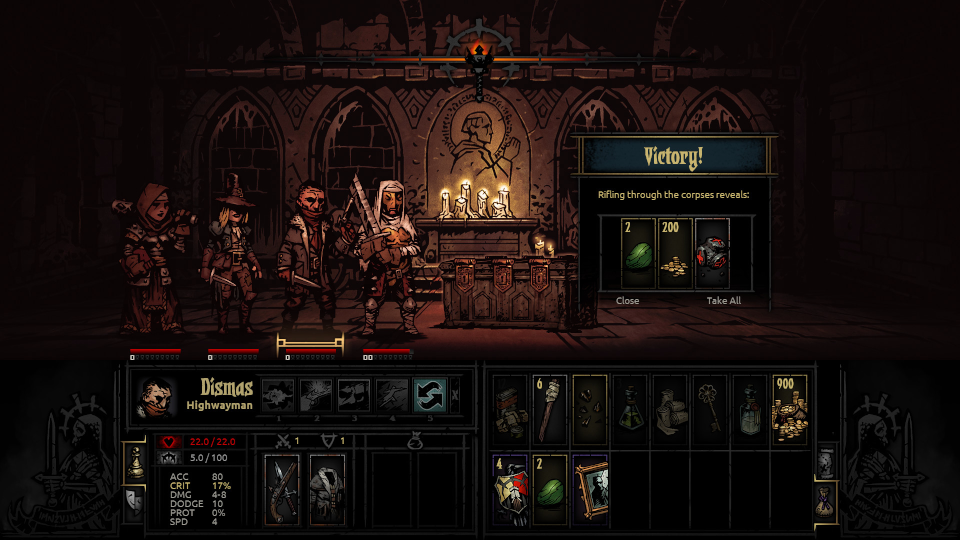Absurdest Academia (A ‘Darkest Dungeon’ Parody)
Tags: academia, musings, research
Staying in academia requires, among other things, a healthy dose of humour. Its is therefore not surprising that many academical aspects are likened to more whimsical pursuits. The great Matt Might, for instance, has a roaringly funny series of posts, describing both the nine kinds of students you will meet in the classroom and the types of reviewers you will face in terms of characters from the game Team Fortress 2.
While there would be many ways to update such typologies based on other games,1 I want to focus on how we are playing in academia. To wit, I think that modern research efforts are almost perfectly captured by Darkest Dungeon, a challenging ‘roguelike’ game about discovery, stress, and resource management. In this post, I hope to convince you that Darkest Dungeon can be used to learn valuable lessons about many aspects of research.

Before we go: I named this post ‘Absurdest Academia’ not only because of the nice alliteration but also because certain efforts in academia appear absurd to outsiders; or maybe they are objectively absurd and we just have convinced ourselves that they are not? For instance, I have written a lengthy post on how weird our relationship with for-profit publishing companies is, and in every conference cycle, Twitter provides boundless examples of strange situations in the review process… But enough about this—onwards we go!
Entering the dungeon
Even though it features elements of eldritch horror, Darkest Dungeon may strike you at first as a run-of-the-mill role-playing game: you lead your party on quests, trying to gain more knowledge and re-establish your family’s estate. However, this is not all there is; the game quickly exhibits more complexity than many of its genre:
-
Your heroes don’t just have life points, but also a stress level. Certain actions—landing a devastating hit, vanquishing a foe, and so on—may decrease their stress, while others—activating a trap or having insufficient light available, for instance—may increase stress, and often quite rapidly so. If their stress level is too high, you risk losing them.
-
Your heroes all have different traits and quirks. A hero might prefer fighting in a specific area, for instance, or might experience more stress when fighting against a certain type of enemy. While the game gives you some control over these traits and quirks in exchange for in-game currency, which you must first acquire through quests, there is a random element to this: essentially, you can recruit new heroes in every round, but it’s a ’take it-or leave it’ type of situation (plus, the number of heroes you are allowed to have on your payroll is limited). In contrast to other role-playing games, Darkest Dungeon does not offer you the option to create your own perfect hero.
-
Expeditions—quests—vary in difficulty and rewards, and your heroes have to be provisioned accordingly before embarking on their journey. Provisions, however, cost money. This provides a certain conundrum: you need to spend money to make money! In addition, any afflictions your heroes suffer on an adventure remain with them afterwards. There is no ‘instant healing’ available after returning from a quest. Your estate offers some options for heroes to be cured or reduce their stress level, but all these options cost money and make your heroes be unavailable for a time.
Next to these novel ingredients, there are also the standard ingredients you might expect: heroes come in multiple classes whose abilities are ideally very much complementary.2 You have your regular ’tanks,’ i.e. heroes that are primarily about dealing damage to enemies, but you also have some more ‘supporting’ characters that can increase the abilities of their comrades or weaken the enemies. Here’s an example of such a hero, the ‘Jester.’ Jesters are one of the most versatile character classes in Darkest Dungeon. They can change positions within the party easily, being both capable of ‘buffing’ your heroes and inflicting damage on the enemy. This particular hero prefers fighting in the ‘Warrens’ area, but suffers from more stress when fighting against eldritch monsters.

Lessons to be learned
I first played Darkest Dungeon in 2016 while I was writing my dissertation.3 Already at this point, it occurred to me that the game had quite a lot of lessons to teach me, and over the years, I found many things to add to the list.
-
The first lesson is that academia—like life itself—is fundamentally about marshalling your resources in a balanced fashion. I lost many a party because I wanted the same heroes to grow too quickly, or because I wanted to beat a certain boss in the game. Similarly, if you have too many projects at the same time, you may not make significant progress on any of them.
Lesson: take your time and don’t overextend yourself. -
Another important lesson is that the stress level of your heroes needs to be managed. Going on too many quests in quick succession is the fastest way to lose your party. They will either succumb to stress or to disease. The same is true in academia: especially if you are in the position to lead teams, you should ensure that not everyone is ‘on fire’ or ‘on call’ all the time.
Lesson: resting and reflecting is crucial. -
As you progress through different areas of the game, you will also learn more about which combinations of heroes ‘work’ and which don’t work. You cannot expect to win against all foes with the same party of heroes. Moreover, the best parties are complementary—a support role is as important as a damage dealer. This is a valuable lesson for academic projects as well: certain projects require a certain combination of authors; everyone needs to contribute so that everyone may win!
Lesson: knowledge of self and knowledge of others makes for excellent science.

-
A secondary aspect of the previous lesson is that you should also know which combination of heroes works against which foe. You may have the best group with highly complementary skills, but it might be completely ineffective in some environment! The same applies to your academic projects: writing conference papers, grant proposals, or white papers—each specific type of project has different challenges, necessitating a team that is well-equipped to address them.
Lesson: know the domain and pick your team accordingly. -
The last lesson, and potentially the hardest one, is about losing. Darkest Dungeon is merciless in that regard: you can pick the best party of your veteran heroes, provision them properly, and you may nevertheless lose the fight. In mathematical terms, your choices and preparations are only a necessary condition for victory, but not a sufficient one. Robert Burns expresses this beautifully in his poem To a Mouse:
The best-laid schemes of mice and men
Go oft awry,
And leave us nothing but grief and pain,
For promised joy!The same goes for your papers, grants, and other things: you can pick the best team, write the best text, perform the best experiments—and nevertheless face rejection. Darkest Dungeon teaches us that such setbacks are to be expected and that they are not the end but only temporary.
Lesson: preparation is key, but there’s only so much you can do.
The positive aspect of the last lesson is that you should celebrate your victories, though they may seem trifling to you.4 Quest by quest, room by room, paper by paper, grant by grant, you will make some progress. In this, Darkest Dungeon can almost be seen as a metaphor for anything one might undertake in life. The fact that it teaches you these lessons in a low-stakes environment is great and, reflecting back on this game, I gained much more than a few enjoyable hours!5
Not everything is a metaphor…
Before you go off, let me also briefly outline to what extent this comparison fails. I do not think that treating academia as a ‘fight’ is a good idea. It might help in the short run to consider every rebuttal a fight against truculent or slothful reviewers, but in the end, academia is made up of regular people, not sinners and saints. If we must use warlike language, let us rather consider that academia is a battle against ignorance or an epic quest for knowledge. That, I believe, will be far better for all of us in the long run.
Conclusion
Nevertheless, ignoring the interpretation of what fights mean in an academic context, Darkest Dungeon has taught me much. If you only take one bite-sized quote from it, let it be this one, spoken by the narrator of the game when you fail in an expedition:
You will endure this loss, and learn from it.
Good luck on all your expeditions and quests, may they be crowned with success!
Disclaimer: All illustrations are taken from the official Darkest Dungeon Press Kit. The images constitute copyrighted material by Red Hook Studios, Inc. This blog post has no commercial interests and adheres to the official Fan Creation Usage Policy. If you like my description of the game, consider buying it on Steam or gog.com. I am not affiliated with any of these links and will not gain any money from your purchase.
-
Some wag on reddit, for instance, created an ‘alignment chart’ for machine learning algorithms. ↩︎
-
I would love to see a post on linking certain classes to well-known scientists… ↩︎
-
I am what some people would call a ‘filthy casual’ player, but even I could enjoy battling some Lovecraftian horrors after work. One meta-lesson to be learned here: one does not have to be good at something to enjoy it. (The comparison to academia is quite obvious here.) ↩︎
-
Readers familiar with Darkest Dungeon might enjoy the vernacular I am adopting here. Others might want to check out the game at some point and re-read the post afterwards. ↩︎
-
Even though this would have been a sufficient reward on its own. ↩︎